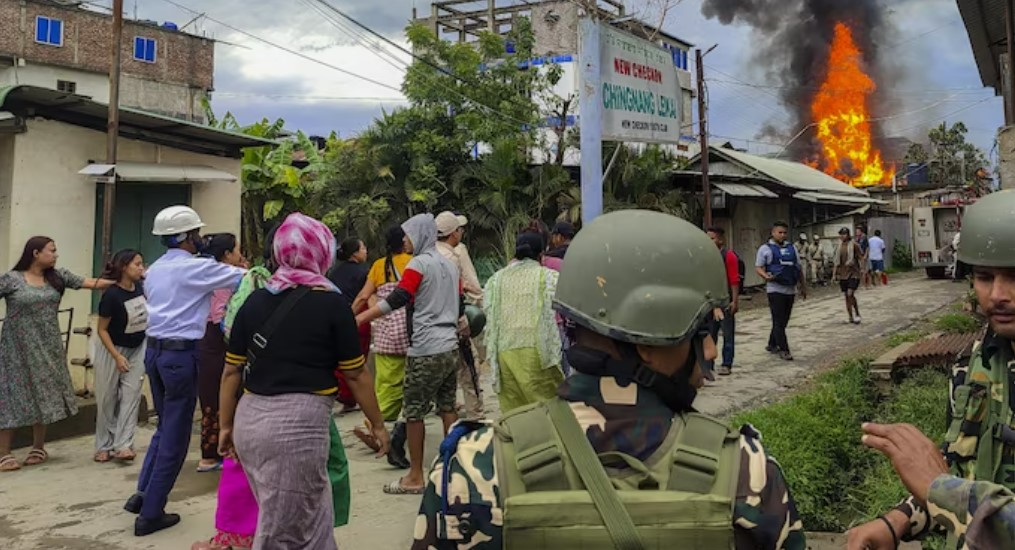FOR the last 50 days north-eastern state of Manipur has been literally burning with fierce clashes between the tribal communities and the large-scale deaths, destruction and displacement that have dented the image of the Indian government.
The clashes have both tribal and religious elements with the gutting and looting of houses, businesses and houses of worship.
In this regard, the Indian government should be criticised for letting these kinds of deadly clashes occur and for not acting immediately to nip the conflagration in the bud.
With large scale killings and destruction, the acrimony and bitterness between the combatting forces will be hard to appease and bring peace. When the clashes were in full swing in early May, Prime Minister Narendra Modi was campaigning feverishly in the Karnataka state election.
The north-eastern states were gifted by the British when India became independent in 1947. Most of these states were not part of India proper throughout its long history but were annexed by the colonial British very much like Bhutan, Sikkim, the Andamans and Nicobar in the Bay of Bengal.
For the longest of time, India had neglected this region as the populations are diverse and small – and not politically significant – apart from the insurrections of many decades.

India spent more on defence to contain the insurgencies in this region instead of socio-economic programmes. With the Bharatiya Janata Party (BJP) coming to power, more infrastructural and other developments have been started.
This region is sensitive and vulnerable due to various factors as China is claiming parts of Arunachal Pradesh in addition to pouring of illegal immigrations and refugees from neighbouring countries and the insurrection in Myanmar against the military government.
‘Faulty classification’
The way this region was partitioned in 1947 shows much incompetency and immaturity on the part of the Indian leaders during this time for accepting the boundaries.
An ignorant Englishman, Cyril Radcliffe, drew the borders for the partitioning of India as and how he liked.
India’s access to this large mountainous region of eight states, including Sikkim, is through the choking ‘chicken neck’ land link between Bangladesh and Nepal.
There is no sea link for this entire north-eastern region, and this has retarded development. The Bay of Bengal is fast becoming more important and strategic due to an increased Chinese maritime presence in Myanmar which has alerted India.
This region, if accompanied by large investments and infrastructural development can progress much as it is also close to the economically vibrant ASEAN countries. It is in India’s interest to keep this region stable and peaceful.

The main reason for the Manipur ethnic clashes is the poor socio-economic status of the people. For long the status quo has been maintained by the so called classifications – scheduled castes (SC), other backward classes (OBC) and scheduled tribe (ST).
It is negative for India after 75 years of independence to rely on these classifications to ensure progress for the more vulnerable and backward groups. These classifications appear to stagnate the progress of the people.
The Manipur conflagration broke out when the Manipur High Court – without authority – recommended that the majority community, the Meiteis, be given a new ST status which threatened other minority tribes such as the Kukis and Nagas’ hold on their land rights.
Socio-economic progress should be for all and there is no reason for these classifications which stagnate the status quo and is a powder keg that can trigger violence at any moment if the so-called privileges are withdrawn or reduced.
After 75 years of independence, it is time India gets rid of these caste, religious, communal, tribal and other classifications.
All-round socio-economic progress will mean that there is no need for these artificial grouping. India needs to make rapid egalitarian socio-economic progress – like China – to benefit all citizens.
Socio-economic progress and development will ensure that tribal differences and militancy in Manipur will be eliminated altogether, and this should apply to the whole north-eastern region that has plenty of resources and potential to be a vibrant part of India. – June 23, 2023
V. Thomas is a reader of Focus Malaysia.
The views expressed are solely of the author and do not necessarily reflect those of Focus Malaysia.
Pic credits: Press Trust of India (PTI)









